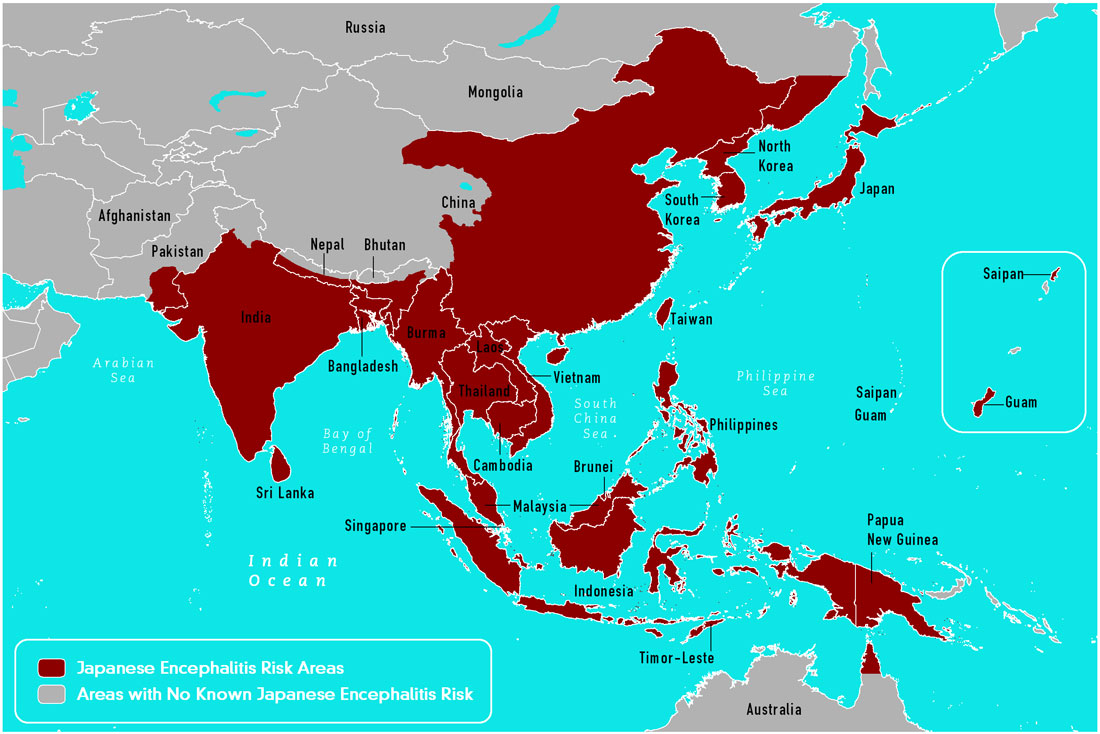Should You Get the Japanese Encephalitis Vaccine?
Japanese Encephalitis (JE) is the most common vaccine-preventable cause of encephalitis (swelling of the brain) in Asia. With so many travellers exploring Asia one might assume this vaccine is extremely popular, but as it turns out,mostpeoplefrom Canada travel to Asia unprotected.
There are several factors that might influence a person’s decision to get the JE vaccine. The vaccine cost is often a deciding factor for many people. The overall low risk of the disease or lack of awareness about the severity of the disease could also affect a person’s decision.
Below you’ll find information about Japanese encephalitis disease, the JE vaccine and preventative tips to avoid this serious mosquito-borne disease while you are travelling.
What is Japanese encephalitis and where is the risk?
JE is a potentially serious viral infection spread through the bite of an infected mosquito.The mosquitos that carry the virus are mainly found in rural agricultural areas and tend to bite during the hours from dusk to dawn. The virus is maintained in a cycle between mosquitos and animals, usually pigs or wading birds, so it is often a risk around farms, rice fields, or areas of flood irrigation. Although these environments tend to be in rural areas, in many parts of Asia these environments occur near or within urban areas. You do not need to be on a farm to be at risk for JE.
JE occurs throughout most of Asia and parts of the western Pacific. The virus has been found in northern Australia, Bangladesh, Brunei, Burma, Cambodia, China, Guam, India, Indonesia, Japan, Laos, Malaysia, Nepal, North Korea, Pakistan, Papua New Guinea, Philippines, Russia, Saipan, Singapore, South Korea, Sri Lanka, Taiwan, Thailand, Timor-Leste, and Vietnam. In temperate areas of Asia, the highest risk for JE is in the summer and fall. In the tropics the risk can occurthroughout the year, often peaking during monsoon season (including Indonesia, Philippines, southern Thailand, and southern Vietnam).

Source: https://www.cdc.gov/japaneseencephalitis/maps/index.html
JE risk for travellers
The overall risk of JE is very low for most travellers, but the risk varies depending on destination, types of activities, duration, and season of travel. From 1973 to 2015 only 79 cases of JE in travellers were reported to the CDC. Most cases were in travellers to Thailand and Bali, Indonesia, followed by China and Philippines. Long-term travel to rural areas will increase a traveller’s risk, but even brief travel can increase the risk if there will be extensive outdoor exposure during the evening and nighttime during periods of high JE transmission. In 2017 an Australian traveller died from JE after visiting a resort in Phuket, Thailand for only 10 days. Although this is a rare case for a such a low risk trip it is important to remember that the risk is not limited to farming areas. There has not been a case in a traveller visiting urban centres only.
Potentially serious consequences of JE
Most people infected with JE do not have symptoms. Of those infected, 1% develop symptoms between 5-15 days after being infected which can be as mild as fever, headache and vomiting. More serious symptoms of encephalitis can follow, including mental and neurological changes, movement disorders and seizures, which can result in death or permanent disability. As many as 30% of those people will die, and 30-50% will be left with serious neurologic, cognitive, or psychiatric consequences. There is no specific treatment for JE.
Preventing Japanese encephalitis
The best way to prevent JE is to avoid being bitten by mosquitoes:
- Stay in accommodation with air conditioning or well-screened windows and doors, or sleep under a mosquito net.
- Wear light-coloured long sleeves and pants, especially during peak biting times.
- Apply insect repellent with 30% DEET or 20% Icaridin onto exposed areas of skin.
Vaccine considerations
The JE vaccine is available in Canada as a 2-dose series given 28 days apart. An accelerated schedule is also available for adults 18 years of age and older as 2 doses given 7 days apart. A booster dose after 1-2 years is recommended to ensure long term protection up to 10 years. The vaccine is generally recommended for travellers who:
- Plan to spend at least a month in areas where JE occurs
- Plan to travel for less than a month but will be spending a lot of time outdoors in rural or agricultural areas
- Plan to travel to areas where there is a JE outbreak
- Are long stay urban expats (due to the likelihood of occasional rural travel)
- Are not sure of their travel plans
- Are short stay travellers in risk areas but desire maximum protection
If you fit any of these criteria, don’t hesitate to book your appointment for a pre-travel consultation. The travel health specialists at TravelSafe Clinic can help to assess the risks for your trip and determine if you should get the JE vaccine.
TravelSafe Clinical Educator – Kristin Cain, RN, BSc, MSc(A)
Photo by Kristin Cain



